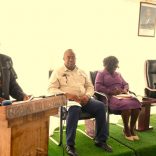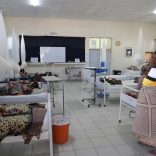Mozambique – New displacements due to NSAG attacks, Situation Report #1 – Chiúre, Ancuabe and ...
Mozambique: No impunity for police instructors who abused women trainees, urges Josina Machel

File photo: DW
The scandal of the sexual abuse of women police trainees by their instructors at the Matalana centre, on the outskirts of Maputo, “has opened an enormous can of worms on the appalling reality of the abuse of women’s rights, through the practice of the rape of defenceless women”, writes Josina Machel, daughter of Mozambique’s first President, Samora Machel.
In an article widely circulated on social media, Josina, who is an activist against domestic abuse, wrote that the 15 trainees known to have been abused “left their homes in search of education, training, and knowledge so that they could work and make a living for themselves and for their families, at the service of the State. Bu they ended up victims of systematic rape, victims of violence perpetrated by the men responsible for their education, victims of those who should have guaranteed their protection and safety”.
Now they, and the other women on the training course, “need specialist medical care urgently, to deal with the trauma they have passed through. Certainly they are not the only ones who suffered abuse”.
The 15 are “the visible face of the scandal” because they became pregnant. There must have been others who did not become pregnant, but were also abused, Josina wrote.
Sexual abuse in educational institutions is no secret, she added, and is a sign of “consecutive, normalised, encouraged and institutionalised behaviour”. Indeed, were the Ministry of the Interior to carry out a serious investigation “we might find out that the rape of trainees is part of a ritual whereby the female novices are introduced to the institution”.
Josina feared that the abuse had been going on for years and that “thousands of women who passed through this training centre were also humiliated, abused and raped by their instructors”.
Society should ask, she suggests, how many instructors raped the 15 trainees. “Will we know who these rapists are, their names and their faces?”, she asked, “or will they enjoy the privilege of remaining anonymous?”
Josina argued that merely suspending the instructors from their duties is far from sufficient. She noted that violence against women was made a specific crime by the Mozambican parliament in 2009. Those who abuse women “are criminals, just as thieves and murderers are”.
Merely suspending them would mean they might be transferred to other positions inside State institutions. “That would be a slap on the wrist, and case closed”, Josina exclaimed. “That is unacceptable. Criminals should not have room to operate in State institutions”.
“We cannot have a den of criminals inside institutions which have the duty to protect women and all citizens”, she insisted. “Let them be made an example of so that all abusers know there is no room for them in this society. It must be shown that laws exist to be applied. Otherwise, what use are they?”
The abusive police instructors “must not go unpunished”, wrote Josina. “They do not deserve any protection. For them, imprisonment is the appropriate punishment”.
She called on the Ministries of the Interior, Education, Gender and Justice, together with the Attorney-General’s Office, to open an investigation that will have a public outcome. Such an investigation must reach out to the women who have been abused.
“Impunity feeds the violence of men against women”, she warned.
Josina also recalled the words of her father. Back in 1967, during the war of liberation, Samora Machel wrote “we did not create the Women’s Detachment in the Frelimo army in order to provide lovers for the commanders”.











Leave a Reply
Be the First to Comment!
You must be logged in to post a comment.
You must be logged in to post a comment.